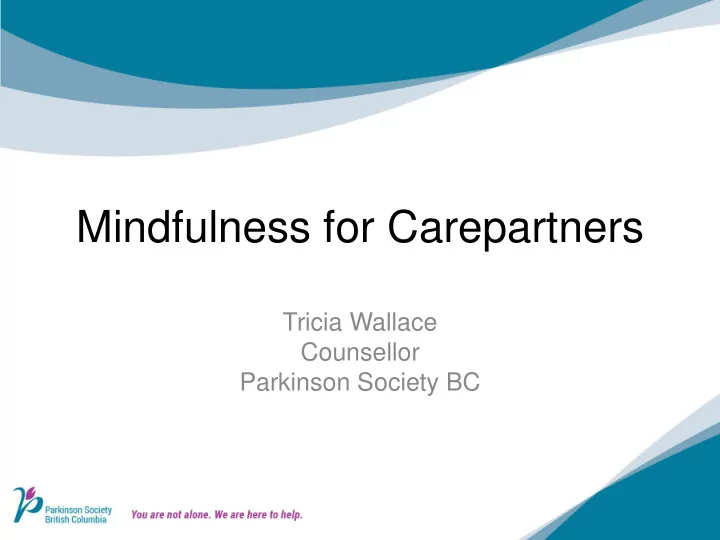

Mindfulness for Carepartners Tricia Wallace Counsellor Parkinson Society BC
Goals • To introduce mindfulness as a concept • To apply ideas about mindfulness to the specific context of being a carepartner • To engage in mindful practice • To explore possible barriers and respond to them • To make a personal plan that supports success for change
WE DO NOT REMEMBER THE DAYS, WE REMEMBER THE MOMENTS. CESARE PAVESE
Mindfulness Defined A working definition of mindfulness is: the awareness that emerges through paying attention on purpose, in the present moment, and nonjudgmentally to the unfolding of experience moment by moment. John Kabat-Zinn (2003)
What Mindfulness is Not • Mindfulness is not about escaping or fixing anything. • It is not about disappearing into the moment. • It does not mean that we become passive when mindful. Kabat-Zinn
Mindful Review Turns Observation Planning Turns to Judgment with Anchor to to Worry Moment
Nervous System Regulation Central NS Peripheral NS Autonomic Somatic Regulates Internal Body Processes Motor and Sensory Information SNS PNS Fight & Rest & Flight Digest Freeze
Anger/Anxiety Mountain Overwhelm! • Not able to hear others • Not able to reflect Regrouping Period • The mind becomes more flexible again. • Fight, Flight, Freeze Emotions cool off. System Turns On !!!!!!! Rest and Digest System Can Turn On Venting feelings • We can still listen and reflect
Carepartner Mountain Ranges We often ‘follow’ our thoughts and feelings like fear and anger, !!! reigniting the alarm system. This is ! hopeless! I shouldn’t !!!! have yelled! What? Again? !!!!
Focused Work Be kind to yourself. No human can stop reactions at this point. Use this time to reflect on What is happening in my experiences and body? responses. What do I sense? What worked and what What am I feeling right can you do differently? now? Listen to your NO ROOM FOR alarm bells JUDGING YOURSELF! Express my feelings. Talk about my experiences
Using Our Senses • What is happening in my body? • What do I sense? • What am I feeling right now? • The path to answering these questions opens up a space between experience and reaction.
Barriers • What barriers exist in your experience? – I’m too busy to meditate! – I’m exhausted! – I need to veg out. – I fall asleep when I meditate.
What Cues the Need to Practice? • Cues signal an overload in our nervous system – Emotions – Actions – Escape behaviours – Issues with Rest and Sleep
Structured Practice • Find something that works for you – Visualization – Walking – Music – Guided recordings – Use a symbol – Find a mantra
Integrating Daily Mindfulness • Doorknobs • Brushing teeth • Mindful eating • Use aromas in meditation and elsewhere • Car meditation (NOT while driving!) • Waiting room meditation • Where are my feet? • 5,4,3,2,1 quick grounding
Mindfulness Can Help Carepartners Reset Reflect Reconsider
PSBC • We can support you with plans for mindful practice. – Contact us for resources – Consider our free counselling – Join our 8 week online mindfulness workshop series starting March 23 rd .
Recommend
More recommend